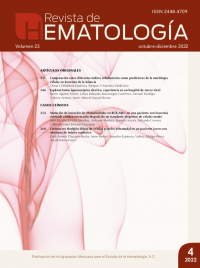Mutación de inserción de 35 nucleótidos en BCR-ABL1 en una paciente con leucemia mieloide crónica en recaída después de un trasplante alogénico de células madre
Rev Hematol Mex. 2022; 23 (4): 254-259. https://doi.org/10.24245/rev_hematol.v23i4.7770
Itzel Elizabeth Vidal-Sánchez,1 Adriana Alvidrez,1 Brenda Acosta,1 Eduardo Cervera,1 Gilberto Israel Barranco-Lampón1,2
1 Hematology Department, Instituto Nacional de Cancerología, Mexico City, Mexico.
2 Hematology, Hospital General de México Dr. Eduardo Liceaga, Mexico City, Mexico.
Abstract
BACKGROUND: Tyrosine kinase inhibitors (TKI) are crucial when treating patients with chronic myeloid leukemia, as they are considered first-line therapy, replacing other potential curative strategies, such as stem cell transplantation (SCT). However, several patients in the chronic phase fail to achieve optimal response to initial therapy with imatinib, and alternatives should be considered.
CLINICAL CASE: A 53-year-old female patient diagnosed with Philadelphia chromosome-positive chronic phase-chronic myeloid leukemia, initially treated with imatinib. She underwent a failed allogeneic SCT (allo-SCT), for which imatinib therapy was reinitiated and, after several years, drug resistance was documented. The BCR-ABL135INS mutation was found, and treatment with dasatinib, a second-generation TKI (2GTKI), was started. After twelve months on dasatinib, neither cytogenetic nor major molecular responses have been achieved.
CONCLUSIONS: Mutations in the BCR-ABL1 gene causing alternative splicing variants are only one of the many proposed mechanisms of TKI resistance and should be taken into consideration when there is a failure to achieve response milestones to standard treatment.
KEYWORDS: Chronic myeloid leukemia; Tyrosine kinase inhibitors; Imatinib; Dasatinib.
Resumen
ANTECEDENTES: Los inhibidores de la tirosina cinasa son decisivos en el tratamiento de pacientes con leucemia mieloide crónica, ya que se consideran terapia de primera línea, reemplazando otras posibles estrategias curativas, como el trasplante de células madre. Sin embargo, varios pacientes en la fase crónica no logran una respuesta óptima a la terapia inicial con imatinib y deben considerarse alternativas.
CASO CLÍNICO: Paciente femenina de 53 años diagnosticada con leucemia mieloide crónica en fase crónica cromosoma Filadelfia positivo, tratada inicialmente con imatinib. Se sometió a un trasplante de células madre alogénico fallido (alo-SCT), por lo que se reinició la terapia con imatinib y, después de varios años, se documentó la resistencia a los medicamentos. Se encontró la mutación BCR-ABL135INS y se inició tratamiento con dasatinib, un TKI de segunda generación (2GTKI). Después de 12 meses con dasatinib, no se han logrado respuestas citogenéticas ni moleculares importantes.
CONCLUSIONES: Las mutaciones en el gen BCR-ABL1 que causan variantes de corte y empalme alternativas son solo uno de los muchos mecanismos propuestos de resistencia a inhibidores de la tirosina cinasa y deben tenerse en cuenta cuando no se alcanzan los hitos de respuesta al tratamiento estándar.
PALABRAS CLAVE: Leucemia mieloide crónica; inhibidores de la tirosina cinasa; imatinib; dasatinib.
Received: August 2022
Accepted: October 2022
This article must be quoted: Vidal-Sánchez IE, Alvidrez A, Acosta B, Cervera E, Barranco-Lampón GI. A 35-nucleotide insertion mutation in BCR-ABL1 in a patient with chronic myeloid leukemia in relapse after allogeneic stem cell transplantation. Hematol Méx 2022; 23 (4): 254-259.

